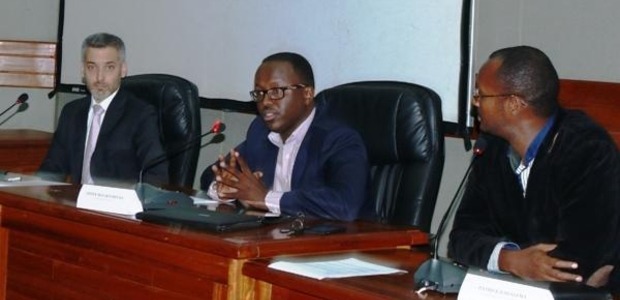advertisement
Kenya’s Free to Air programming code effected
The Programming Code for Free to Air radio and Television broadcasting Services is set to come into force by Midnight…

The Programming Code for Free to Air radio and Television broadcasting Services is set to come into force by Midnight 1st July 2016.
This was said by the Director General of Communications Authority of Kenya (CA), Francis Wangusi during a press conference on the expiry of the grace period for implementation of the programming code, held on 30th june 2016 at the CA Centre.
Last year the regulator developed the Programming Code for Free-to-Air radio and television broadcasting services in consultation with stakeholders in accordance with the provisions of the constitution. The development of the Code was done in accordance with the provisions of Kenya Information and Communications Act, 1998, as amended, and the Kenya Information and Communications (Broadcasting) Regulations, 2009, which obligate the Authority to prescribe a Programme Code that sets the standards for the time and manner of programmes to be broadcast by licensees.
advertisement
“Last week the Media Owners Association (MOA) submitted a Programming Code to the Authority for regulatory approval. The Authority has reviewed the proposed MOA’s code, and advised MOA on the areas to address before submitting a revised version for further consideration by the Authority,” added Mr. Wangusi.
As provided for in the ICT sector law, the Code was published in the Kenya Gazette in December 2015. To facilitate seamless transition into the new environment, the Authority gave broadcasters a grace period of six months to align their operations with the provisions of the Programming Code before this key regulatory tool came to effect.
“The Authority wishes to remind industry players and indeed consumers of broadcasting services that the said grace period lapses today Thursday 30th June 2016, after which the Programming Code for Free to Air radio and TV broadcasting services shall come into force. I wish to note here that the overarching objective of the Code is to protect the interests of consumers, particularly children and minors from inappropriate content during the watershed period,” said Wangusi.
advertisement
The Programming Code requires radio and TV broadcasters to transmit programming that is appropriate for family audiences during the watershed period, which runs from 5:00a.m to 10:00p.m. Licensees are, therefore, discouraged from airing content that depicts or contains scenes that are rated by the Kenya Film Classification Board as adult, or are of a language intended for adult audiences during the watershed period.
To stimulate the local film industry and promote programming that is aligned with our culture, the Code sets out the minimum amount of airtime to be devoted to local content. This requirement is in line with Chapter 11 of the Constitution, which recognizes culture as the foundation of the Nation and as the cumulative civilization of the Kenyan people.
As outlined in the licence terms and conditions, TV broadcasters are expected to meet the 40% local content quota within the first year, and 60% within the fourth year upon commencement of operations. Adherence to this provision is expected to create jobs for our youth and nurture talent in the creative arts industry.
advertisement
The Code equally requires broadcasters to take specific steps to promote the understanding and enjoyment of programmes transmitted in their stations by persons with disability. In this regard, TV broadcasters are required to provide sign language interpretation for news programming, emergencies and events of national importance.
This provision is in line with Article 54 of the constitution that guarantees persons with disability with the right of reasonable access to information.
Other key provisions of the Code include protecting the rights to privacy and safeguarding intellectual property rights of content producers. It also facilitates access to balanced and unbiased news and other programming, which is fundamental to nurturing democratic culture and practice in the country.The programming standards outlined in the Code are based on the provisions of the ICT sector and broadcasting regulations.
Mr. Wangusi also added that the ICT sector law will allow a body of broadcasters to develop and enforce its own programming code subject to obtaining the requisite approval from the Authority. “For such a code to be approved, the law stipulates that the body submitting the Code must be duly registered, and must show beyond any reasonable doubt that all its members subscribe and adhere to the Programming Code that has been approved by the Authority,” he added.
In addition, the body of broadcasters will be required to demonstrate to the satisfaction of the Authority how it would enforce its self-enforced Programming Code. A licensee who subscribes to a Programming Code prescribed by a body of broadcasters shall furnish the Authority with proof of membership, subscription and adherence to the Programming Code prescribed by the body. The Code so developed must also uphold the programming standards outlined in the Act and the broadcasting regulations.
Mr. Wangusi also added that Authority’s code shall be binding to all broadcasters and that the Authority’s Code shall remain a reference document to all the self-enforced codes that shall have received the requisite regulatory approval. Upon, receiving such approval, broadcasters will be expected to move with speed to create awareness on their respective Codes and Complaint Handling Procedures as outlined in the law and licence conditions.
I wish to draw the attention of consumers of broadcast services to the Authority’s Complaints Handling Procedure, which sets out the steps in resolving broadcast content related complaints. The procedure requires consumers to lodge complaints with the offending broadcaster first, and only escalate complaints that have not been adequately addressed by licensees to the Authority.
Wangusi also called on the public to familiarize themselves with the Authority’s Programming Code and the attendant Complaints Handling Procedure, which are already available on the Authority’s website. He also called on broadcasters to work closely with the Authority to ensure the broadcasting industry continuously supports the country’s cultural and socio-economic development.